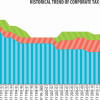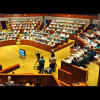Business-as-usual budget

Finance Minister AMA Muhith presented the FY2018-19 national budget to parliament yesterday. This is a historic event in the sense that it is his tenth consecutive budget that reflects the continuity in fiscal management.
The two main highlights of the proposed budget are: first, on the positive side, it seeks to preserve macroeconomic stability even in an election year by proposing to keep the fiscal deficit under control at around five percent of GDP. This fiscal discipline has been a hallmark of Bangladesh's fiscal management that has served the country well.
Second, the worrisome feature is that this is a business-as-usual budget that keeps fiscal policy unchanged over the past three years with no noticeable fiscal measures to strengthen tax mobilisation, no policy measure to reform the banking sector and no visible efforts to strengthen project implementation.
On the numbers front, the proposed size of the budget, Tk 4,64,573 crore, is over-inflated and unrealistic. This is 16 percent higher than the current fiscal year's budget. The problem is that based on the first nine month's revenue collection and the target fiscal deficit, the actual spending in FY2017-18 is not likely to exceed Tk 3,40,000 crore. In the absence of new tax and non-tax measures and other reforms, realistically, the actual size of the proposed budget is not likely to exceed Tk 3,87,600 crore if the budget deficit is kept at 5 percent of GDP.
Except for a minor downward tweaking of the corporate tax rate, and some small increases in tobacco taxation and supplementary import duties, no significant new tax measures have been proposed for the FY2018-19 budget. The government believes that the drive to increase the number of income tax payers is working and continuing this drive is the primary focus of tax implementation of the proposed budget. This assumes that the government will adopt measures to improve tax administration, but these are not clearly identified in the budget.
Regarding non-tax measures, no reforms have been proposed to correct the deficits of the state-owned enterprises (SOEs) or the non-performing loans (NPLs) of the state-owned commercial banks (SCBs). On the contrary, the budget proposes to continue the financing of SOE deficits and capital shortfalls in SCBs through budget transfers.
These suggest that the tax to GDP ratio will at best stay constant at around 9.3 percent of GDP, which amounts to Tk 2,36,900 crore, and the non-tax revenue at 1.2 percent of GDP, which is Tk 30,600 crore. So, total projected revenue (Tk 2,67,500 crore) is likely to fall short by about 27 percent from the FY2018-19 budget target (Tk 3,39,280 crore).
On the expenditure side, the current spending is budgeted to grow to around 9.9 percent of GDP, which amounts to Tk 2,51,668 crore. This reflects the proposed increased allocations for safety net programmes, the Rohingya support programme and other transfers, including subsidies to SCBs and SOEs.
As in the last two years, the expenditure shortfall will mostly concentrate on development spending. In FY2017-18, the total development spending (ADP and non-ADP development spending) amounted to Tk 83,223 crore as compared with a budget target of Tk 112, 527 crore, which is a shortfall of 26 percent.
The projected development spending for FY2018-19 is Tk 1,36,000 crore, which is 5.3 percent of GDP, as compared with the budget target of Tk 1,79,669 crore. This projected ADP size is based on available financing. The constraint of implementation capacity could lower this further.
On balance, the proposed budget is a continuation of the trend set in the last three budgets, with no progress in creating new fiscal space for addressing the spending deficits as shares of GDP on infrastructure, health, education and social security programmes since the launch of the Seventh Five Year Plan (FY2016-FY2020). Consequently, the medium-term growth and poverty reduction agenda identified in the seventh FYP is not likely to be materialised unless major corrective actions are taken on revenue mobilisation after national elections and project implementation capacity is improved.
Additionally, the absence of policy measures to correct banking sector problems and to address the deficits of state owned enterprises is worrisome. The combination of growing non-performing loans of the SCBs, the debt servicing liabilities of the SOEs and inadequate fiscal space can hurt the development momentum moving forward.
Sadiq Ahmed is vice chairman at Policy Research Institute of Bangladesh.

 For all latest news, follow The Daily Star's Google News channel.
For all latest news, follow The Daily Star's Google News channel. 








Comments